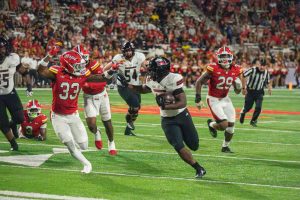Recruiting the foreigner; athletics feels the strain
May 2, 1990
NIU sports programs have been trying to become more competitive on the national scene and have gone overseas to bring in the talent that is needed to compete at such a level.
The NIU men’s tennis program is led by two strong Swedish players and some tennis critics have begun to question the ethics of bringing foreigners to American colleges to raise the level of play. They say it takes away the scholarships from American players. But Charles Merzbacher, first-year NIU head men’s tennis coach, doesn’t look at his top players, Mats Persson and Erik Andersch, as foreign players.
“Mats and Erik are the leaders of our team; they are an example to all our players on how to be a student-athlete and succeed. They are invaluable to us—not just how they play the game of tennis, but how they approach life with such displine. I couldn’t imagine my team without these guys,” Merzbacher said.
Merzbacher has lot of experience in the game of tennis and understands the situation surrounding the foreign players. “As an American high school kid, I would be upset about what’s going on, but my coach at Minnesota, Jerry Noyce (1986 NCAA coach of the year) explained to me that my job is to field the best team I can. We’re at an age in sports now that the separation by the ocean does not matter,” Merzbacher said.
Merzbacher explained it is not in his interest to field a team made up of foreigners like Southwest Missouri State, nine time AMCU champions who had five foreign players on the 1990 championship team. “I think you’re gambling if you’re just recruiting overseas, because you really don’t know if you’re getting the player you’re looking for. I’d like to know if this guy is going to fit into the system. I’d be afraid to recruit foreign players without getting to know him and his family first, because I’m afraid of getting a bad apple.”
The lack of top American recruits who are willing to come to NIU has also contributed to NIU’s seeking talent elsewhere. Patty Groth, the NIU women’s tennis coach, said she does not have the luxury of bringing in top American talent because of the poor tennis facility at NIU. “We’re at a catch-22 situation here, because you (as a coach) have to be successful and if you’re not successful you’re not going to get top talent. But another reason we can’t get top American talent here is because of our facility.”
NIU, the 1990 North Star Conference Champions, has four foreign players: Hild Andersch, Sweden; Lisa Boedecker, Canada; Natalie Todorovic, Yugoslavia; and Monica Larson, Sweden. “It’s hard to recruit the blue-chip, top American players because they want to go to Wisconsin, Northwestern and other Big Ten schools,” Groth said. “But I don’t recruit foreign players because they’re foreign. I do most of my recruiting from junior colleges in Texas, because the top junior college players in the nation are from Texas. Their top players just happen to be foreign players. I don’t pick and choose,” Groth said.
Groth also said she doesn’t see anything wrong with bringing in foreign players, because there are not enough quality Division I products in Illinois. “Most top Illinois players go to nationally ranked Division I teams, but after the top Americans are recruited, there’s still quality left, but not Division I quality. My first motive is to bring in top American talent, but if I can’t get the talent, I’ll try to recruit from another country,” Groth said.
Some ask if should there be a limit on foreigners on each team. Groth didn’t specify “yes” or “no” but said, “It shouldn’t be where we have to limit how many foreign players you can have, because they’re human. When you recruit a foreign player, you’re usually getting a good athlete who’s a good student. The opportunity to compete and to get an education shouldn’t be taken away just because you’re not from this country,” Groth said.
NIU has recently dropped a successful men’s gymnastics program which has been bringing in gymnasts from Brazil to compete, but women’s gymnastics coach Bobbie Cesarek said her program is at a point where it’s on a dramatic rise and if she cannot find the American talent to continue the upward trend, she will not hesitate to look elsewhere. “I don’t do it (recruiting foreigners) as a standard, but I’m looking to improve my team and I’m looking for a certain skill level. As a coach you’re not going to settle for second best.”
There has been criticism of coaches who are not willing to develop the American athletes, but Cesarek said in gymnastics there isn’t much choice. “In gymnastics, if you’re at a college age, you’re on you’re way down. The level of skill you’re bringing in has to be high, because you can’t improve much in college. I can’t take a gymnast who gets an all-around score of 32 in high school and make her into a 36 in college,” Cesarek said.
One NIU coach who wants to see a limit on foreign players is soccer coach Willy Roy. “I don’t mind (other schools) bringing in foreign talent. The only problem is that these foreign players are 20 years old when they’re freshmen. I wouldn’t mind if they brought them in at 18, but at 20, they’re physically stronger and have more maturity—and that’s the difference,” Roy said.
“If NIU wanted to bring in three outstanding foreign players, I don’t think many teams could compete with NIU. But once a school has success with foreign players they’ll keep recruiting them. I’m against it and I don’t think a team should have more than two,” Roy said.






